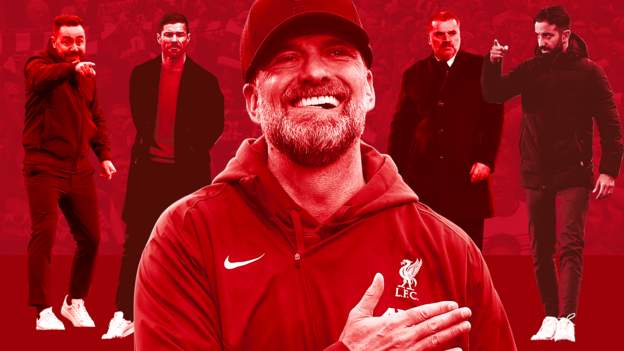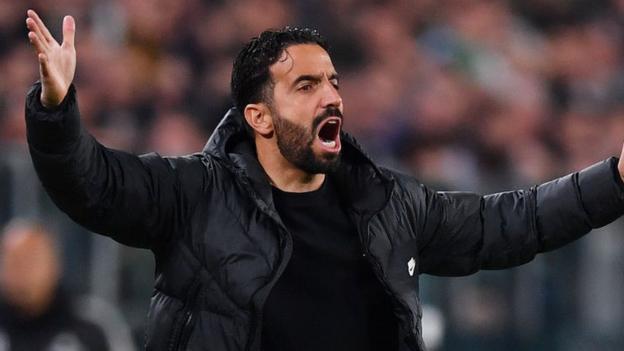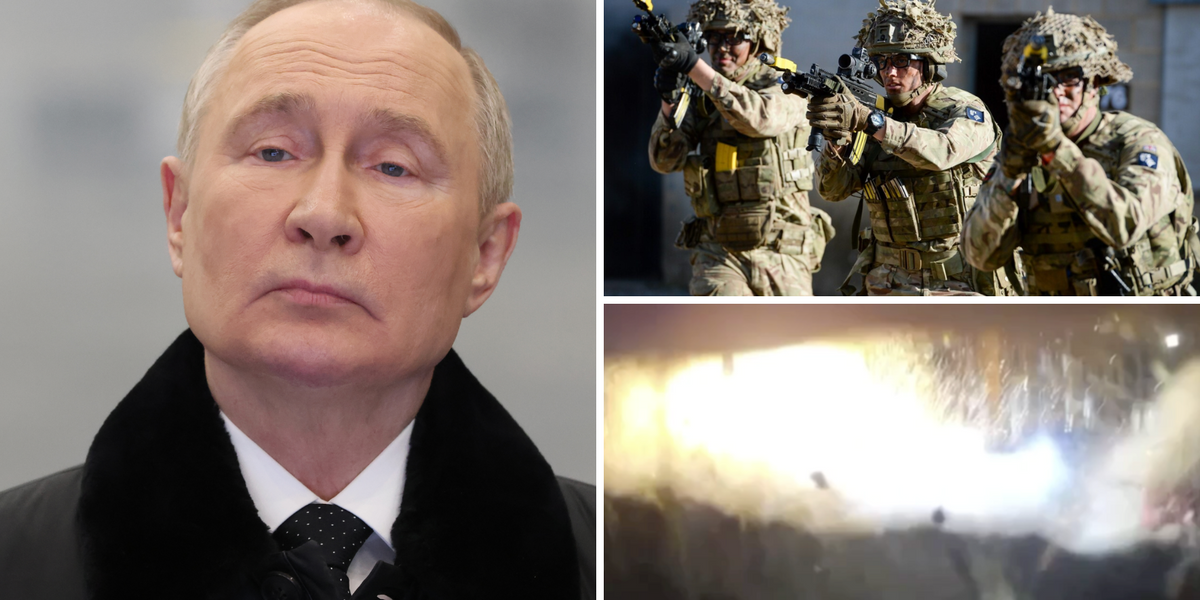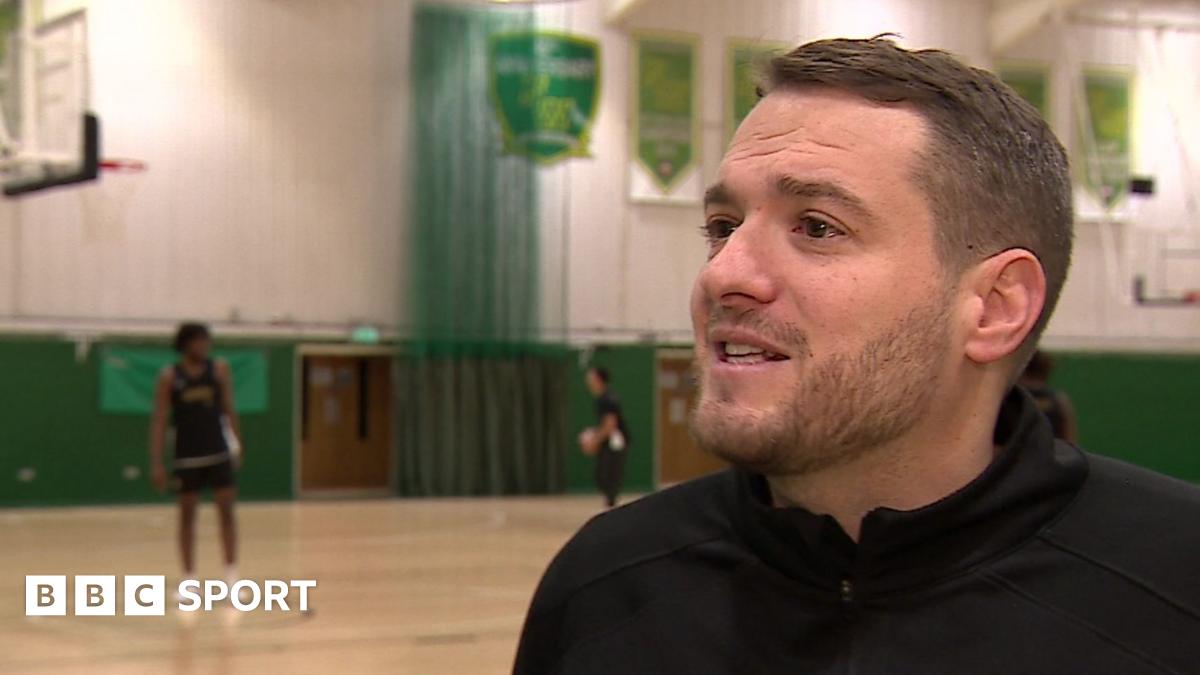Football
Klopp successor? The data’s surprise number one…

Liverpool will have a new manager at the helm this summer for the first time since October 2015, after Jurgen Klopp revealed he would be stepping down at the end of the season.
And, as the popular Reds boss bids to win the club’s first trophy of the campaign in Sunday’s Carabao Cup final against Chelsea, the speculation continues about who could possibly be his successor.
Klopp has won all the major trophies in his Anfield tenure and Liverpool are top of the Premier League and still in the FA Cup and Europa League.
Carteret Analytics – which provides detailed manager assessments to Premier League, EFL, Bundesliga and MLS clubs – has assessed a series of possible candidates, as well as Klopp, to see who would do the best job.
The company says: “Not only has Klopp achieved significant success over the past six seasons in terms of results, his individual metrics demonstrate an exceptionally high level of ‘football intelligence’.
“For example, his strategic intelligence rating is very high. His tactical command rating is even better.”
If you are wondering what strategic intelligence and tactical command are, read on. For in working out the person to replace Klopp, it’s all about the metrics.
Former Reds midfielder Xabi Alonso, also a favourite to replace Thomas Tuchel at Bayern Munich, has dominated much of the discussion after leading Bayer Leverkusen to the top of the Bundesliga, but is he really the man to start a new Anfield era?
We list the candidates in order of their suitability according to Carteret’s analysis, based on a number of key metrics to give an objective sense of the strengths and weaknesses for each head coach.
(The findings are based on actual results that have been achieved over the past six seasons, incrementally weighted towards the most recent seasons, and relative to the strength of the league in which those results have been achieved.)
| Manager | Objective achievement | Strategic intelligence | Tactical command | Attacking coefficient | Success-adjusted attacking coefficient | Shot conversion | Overall possession home/ away | Overall rating |
| Jurgen Klopp | 568.90 | 75.93 | 6.39 | 27.59 | 20.95 | 43.95 | 64 / 60 | 151.0 |
| Ruben Amorim | 486.90 | 84.26 | 6.58 | 25.14 | 21.31 | 40.09 | 60 / 61 | 144.7 |
| Julian Nagelsmann | 429.20 | 98.04 | 3.76 | 20.49 | 18.93 | 40.54 | 68 / 63 | 128.0 |
| Thomas Tuchel | 511.10 | 74.19 | 3.65 | 20.52 | 15.13 | 35.26 | 61 / 64 | 119.5 |
| Ange Postecoglou | 362.70 | 72.22 | 5.11 | 23.18 | 17.11 | 45.83 | 64 / 65 | 116.5 |
| Xabi Alonso | 257.60 | 75.00 | 4.89 | 22.65 | 16.59 | 37.86 | 59 / 57 | 106.9 |
| Roberto de Zerbi | 283.30 | 50.00 | 2.36 | 20.98 | 10.44 | 31.91 | 63 / 62 | 71.3 |
How are the managers rated? The metrics defined
Objective achievement rating: A measure of overall ability based on the premise that the primary objective is to win football matches – rather than, for example, long-term player development or balancing of club finances.
Overall rating (weighted metrics): An overall rating score, based on the actual achievements of the head coach over the past six seasons, but weighted according to their individual performance – so are they overachieving or underachieving in their job?
Strategic intelligence rating: The manager’s ability to prepare and set his team, and analyse the opposition, to maximise the chances of winning the next match.
Tactical command rating: A measure of the manager’s ability to transform a match (during the match), and, in particular, to develop a winning position for the team from various match scenarios.
Attacking coefficient/success-adjusted attacking coefficient: A measure of the manager’s propensity to play an attacking style of football – and the relative impact of the manager’s attacking coefficient on the success of the team. Does the style bring wins?
Team shot conversion rating/opposition shot conversion rating: A key metric that highlights a team’s ability to increase the probability of winning matches. Are they taking the chances they create?
Shot creation ratio: How many chances a manager’s team creates.
Possession: How much of the ball a team has.

Ruben Amorim (Sporting Lisbon) – even better than the real thing?
Portuguese manager Amorim, 39, has emerged as Carteret’s surprise ideal candidate to take over at Anfield.
His stock has risen after guiding Sporting to their first top-flight title in 19 years in 2021 and Carteret says all the analytics point to him “becoming a very compelling option as the next Liverpool manager”.
Those findings make allowances for the fact Amorim’s experience is in a less competitive league, but say his strategic intelligence rating, his tactical command rating, success-adjusted attacking coefficient and shot creation ratio are all even higher than Klopp’s, with an equivalent shot conversion rating and overall levels of possession.
Julian Nagelsmann (Germany interim manager) – hype, headaches and a patient ‘genius’
The former Bayern Munich boss, 36, took over as Germany manager in September but his contract only runs until July 2024 and he would be available after this summer’s European Championship.
He previously shared the same agent as Klopp – Marc Kosicke – and was described by the current Liverpool manager as a “young horse” and a “big, big coaching talent”, with Carteret giving him the highest strategic intelligence rating of anyone.
Its findings suggest the German has a defensive approach but one which he makes work for his teams, with a very methodical, patient and probing style of play.
Carteret does point out, though, that his interpersonal skills would need to be researched more fully and that his style of play could become a problem if not winning matches.
Thomas Tuchel (Bayern Munich boss) – defensive in every sense
With the exception of Klopp, Carteret found Bayern boss Tuchel – who is leaving his post this summer – is “the best of this group of head coaches in demonstrating the ability to win matches at the requisite level” in recent years.
Tuchel rates well in setting up his teams to maximise the probability of winning the next match, but Carteret finds he begins to fall well short of Klopp in his ability to transform matches.
The former Chelsea boss, who led Bayern to the title last season, was also found to have “a very similar defensive style of play as Nagelsmann, and that could prove to be a challenge for Liverpool supporters and for maximising the attacking coefficients of the current Liverpool players”.
Ange Postecoglou (Tottenham) – attack, attack, attack… or is it?
Carteret found some strong similarities between Postecoglou, 58, and Klopp – with strategic intelligence, tactical command, and shot creation ratio broadly equivalent (although all lower than Klopp), as is overall possession.
It finds, though, the subjective perception that he has a very attacking style of play was not borne out by objective analysis. Postecoglou’s attacking coefficient (23.18) – 16% lower than Klopp.
Carteret says this indicates a less progressive style of play – and adds that the defensive elements of that style were also less successful.
“When you consider some of the fundamental metrics that indicate, empirically, transferable success traits, he becomes a serious consideration as the next Liverpool manager. However, there are probably even better candidates,” Carteret said.
Xabi Alonso (Bayer Leverkusen) – an excellent season but…
The favourite. But the 42-year-old Spaniard has a completely different style of play to Klopp.
Not only does Alonso play predominantly with three at the back, he is a bit of a ‘tinker man’, having used six different formations this season alone. Klopp, by comparison, has essentially used slight variations on one formation – an attacking 4-3-3 – a set-up Alonso has only used three times this season.
Carteret also found the pace and attacking set-up of Alonso’s teams do not attack or play with as much pace as Klopp’s Liverpool. Nor is his style as successful as Klopp’s.
Alonso is achieving great results – demonstrating football intelligence in both setting up his team (strategic intelligence) and adjusting his team within matches (tactical command).
Carteret says, though, that these ratings have only been achieved over a very short period of time – and are lower than those of other managers in this list.
“Empirical testing suggests that these football intelligence skills are transferable between clubs and leagues, but it is a risk for Liverpool to appoint a manager with such limited experience,” Carteret said.
“When you then layer on a distinct difference in the style of play and approach to tinkering with formations, it becomes a significant risk to appoint Alonso.”
Roberto de Zerbi (Brighton) – a passionate style?
With the exception of his brief stint at Shakhtar Donetsk – when he won two-thirds of his matches and led them to the Ukrainian Super Cup – De Zerbi’s teams have been firmly mid-table, Carteret says.
There is not a lot, therefore, in an assessment of his results that suggests he can win the Premier League with Liverpool.
Carteret also found none of his metrics are a match for Klopp. Indeed he is significantly lower across the board – strategic intelligence, tactical command, attacking coefficient and shot conversion.
They say: “De Zerbi has certainly created headlines in the UK (as have Brighton as a club generally), but a fully objective analysis of his performance levels (rather than a subjective view of his approach and personality) illustrates that he falls short significantly (in every key metric) from what is required for the next Liverpool manager.”









